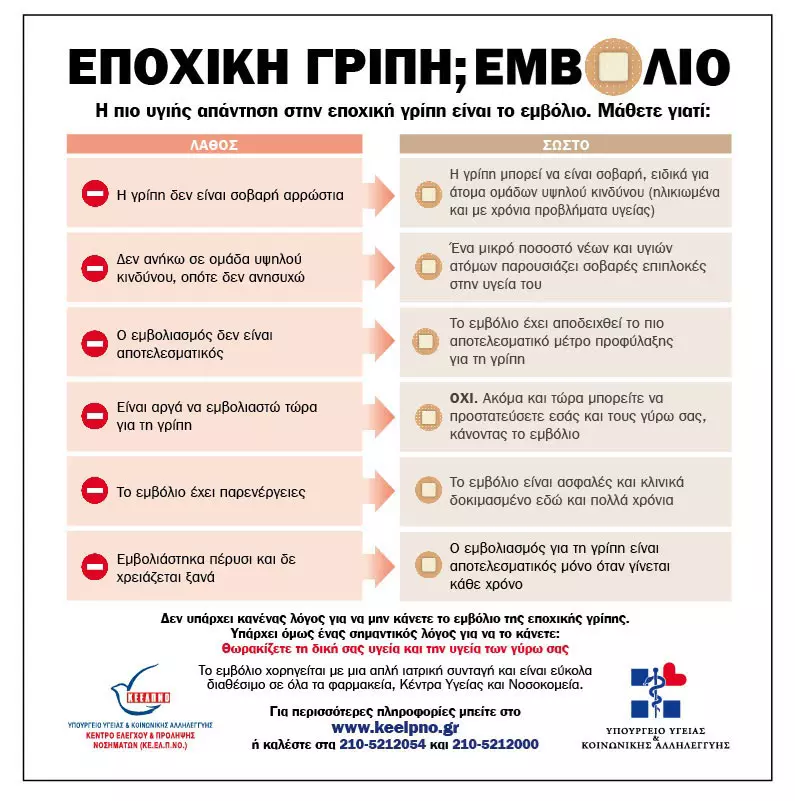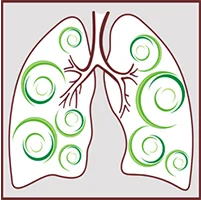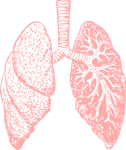The flu is a viral infection caused by the flu virus. It is reasonable to have fear of the flu, as it can cause serious complications, especially in vulnerable groups
In cases of flu onset, medical advice should be carefully followed, and immediate medical assistance should be sought in cases of severe symptoms. During a flu epidemic or pandemic, public health authorities provide guidance and information on how to manage the risk and protect the public.
What is happening today with the flu?
Every winter we go through the flu season, which starts in November, peaks in February and March, and can last until late April!
During this period, many people around us come down with some respiratory infection, often caused by a virus (hence called a cold), such as the flu virus.
From this year’s data (until 2/2/2020), it is evident that we are experiencing a period of very high flu activity in Greece.
151 severe cases of laboratory-confirmed flu have been recorded.
136 individuals have been hospitalized in Intensive Care Units (ICUs) (117 belonged to high-risk groups - 50 (42.7%) of whom were vaccinated).
There have been 38 deaths.
The prevailing flu type is type A (H3N2 and H1N1).
Epidemic Nature of the Flu
Last year (2018-2019), 374 people were hospitalized in Intensive Care Units (ICUs) and 154 died from the flu. 76% of those hospitalized in ICUs belonged to a high-risk group, and only 15% of them had been vaccinated!
For these reasons, the media daily emphasize the need for flu vaccination and sometimes sound the alarm as the data each passing year show a large number of hospitalized cases in intensive care units and an increase in deaths.
From this data, and given that the flu now has an epidemic rather than a pandemic nature (as in 2009), it seems that we should not be afraid as long as we naturally follow the rules below:
1. Vaccination
2. Individual Protection Measures
3.Early examination by a doctor in case of symptoms

Analyzing the Flu and Related Protection Measures.
The Flu & Protection Measures
Flu and other infections pose a significant challenge to individual and public health. Influenza is a disease caused by viruses and can affect the respiratory system, the digestive system, and other important parts of the body.
Among these, the flu stands out for its severity and the potential to cause complications in vulnerable groups. While fear of the flu is justified, knowledge and implementation of appropriate protection measures can help prevent and manage the risk.
Below you will find all the important information you need to know about infections, especially the flu, and the previous rules will be analyzed.
The infection is contagious.
Infection is the contagious disease caused when a virus invades our organism. There are many types of viruses, some of which include the common cold virus, adenoviruses, rhinoviruses, respiratory syncytial virus, coronaviruses, and frequently, influenza viruses
We specifically refer to the flu because it is one of the most serious and common infections. It has been found that every year, at least 20 out of 100 people will contract the flu.
It is the infection that causes epidemics and pandemics with serious socio-economic impact in every country.
In the 20th century, humanity was affected by four pandemics: the Spanish flu in 1918 (with approximately 50 million deaths!), the Asian flu in 1957, the Hong Kong flu in 1968, and the Russian flu in 1977.
The flu is contagious.
The flu is transmitted through the transfer of droplets from an infected person to a healthy one, typically through coughing, sneezing, and intense talking or laughing. It can also be transmitted by transferring these droplets to the mouth after contact of our hands with contaminated objects.
The flu can be transmitted from one day before symptoms appear up to 5-7 days after, a period that may be longer in individuals with weakened immune systems (such as the elderly and those with multiple health issues). In countries with a temperate climate like ours, the flu usually occurs between the months of November and March, while in tropical countries, the flu can happen all year round.
The mild and delayed winters we have experienced in recent years explain the late appearance of the flu during the winter (January, March).
Symptoms of the flu
The symptoms of the flu were first described by Hippocrates in 412 BC. Patients with the flu often experience fever, which can be high, cough (productive or dry), sore throat, runny nose, congestion, shortness of breath, fatigue, chills or shivering (feeling of cold water on the body), muscle or joint pain, weakness, headache, diarrhea, and vomiting, especially in children.
How can we help our bodies deal with the infection?
When we are sick, we should rest at home, drink plenty of fluids (water, soups, juices), eat well, and manage symptoms without excess: fever-reducing medication only for high fever, decongestant sprays for a few days only, avoid smoking, avoid taking cough suppressant syrups, and refrain from obtaining antibiotics without a doctor's opinion
Protection Measures against Infections.
The Importance of Nose and Mouth Covering
To reduce the likelihood of transmission, we should cover our nose and mouth with a tissue when coughing or sneezing and dispose of it afterward (Individual protection measures).
Additionally, we should practice personal hygiene at home (use separate cups, towels, etc.), while when vulnerable individuals (pregnant women, infants, elderly) are present, it’s advisable to wear single-use masks when entering their room.
To prevent spreading to those around us, we should stay in our room for at least 24 hours after the fever subsides. Hard surfaces in our room (doorknobs, tables, toilets, sinks, phones, toys) should be cleaned with soap and water or common household cleaners known to destroy the virus. Furthermore, bed linens, towels, clothes, and dishes should be washed regularly along with the rest of the family’s.
When there’s a flu patient in the family or workplace, to protect ourselves (especially if we have any health issues), we should avoid close contact if possible.
It’s important to frequently and thoroughly wash our hands with soap or hand sanitizer, avoid touching our eyes, nose, and mouth, as this is how viruses are transmitted.

Why is there so much talk about the flu
The flu is one of the most serious infections as it can cause many complications, especially in people suffering from certain diseases. The most common serious complication is pneumonia, which can be caused by the virus itself or by another microbe that has invaded our body due to weakened immunity.
The flu can also worsen asthma, chronic obstructive pulmonary disease, cardiovascular diseases, liver and kidney failure, and exacerbate diabetes. Those at risk also include individuals taking medications that weaken the immune system (immunosuppressants – chemotherapy), those suffering from hematological disorders, or the elderly. In children, the flu can lead to dehydration, while in pregnant women, it can lead to complications for both the mother and the fetus.
For this reason, those with any of the above factors should inform their doctor.
Complications of the Flu and the Importance of Prevention
Complications may even occur in healthy individuals. Symptoms that should concern us include: difficulty breathing or rapid breathing, bluish lips or skin, rash, chest or abdominal pain, high fever that does not respond to antipyretics and lasts for days or reappears after improvement, severe headache-dizziness-confusion, inability to take fluids due to vomiting, etc. All of the above are reasons for immediate notification of our doctor.
As for the specific medications available for treating the flu, antivirals are prescribed only upon a doctor’s recommendation in specific cases (1. in patients with underlying diseases predisposing to increased risk of complications 2. when the doctor assesses that individuals without other diseases are at risk of complications and 3. in individuals who have come into contact with an infected person and are at risk of complications if they become ill). These drugs are effective when administered early.
There is no reason to take antiviral medication in all patients, and generally, they should not be treated as miracle drugs because they do not provide complete protection, at least as much as the flu vaccine can offer.
It is evident that in order to prevent complications and administer antivirals where needed, timely examination by a doctor should be sought if we have symptoms.

Annual Vaccination
The most effective way to prevent seasonal flu is annual vaccination. The first vaccine was released in 1940, and since then, they have been produced annually to cover new strains of flu viruses according to epidemiological observations of the World Health Organization worldwide.
Flu vaccines contain parts of flu viruses and therefore cannot cause the flu. Its effectiveness depends on the individual receiving it, and it has been found to reduce the risk of death from flu complications by 48% in individuals over 65 years of age.
The strict and consistent production method over 50 years, the administration of hundreds of millions of doses to date, and the minimal side effects it may cause make it completely safe when administered according to indications.
The flu vaccine should be administered in a timely manner and before the usual period of flu outbreak, as it takes about 2 weeks to achieve an immune response.
According to the national vaccination program, flu vaccination is recommended for all individuals over 6 months of age (if desired).
It should be noted that the more people vaccinated, the better the population’s immunity (herd immunity), resulting in the limited transmission of the flu.
The flu vaccination consists of a single dose of the vaccine.
Vulnerable Groups and Vaccinatio
It is particularly important for influenza vaccination to be administered to individuals (adults and children) who belong to the so-called high-risk groups.
The Critical Importance of Influenza Vaccination in Vulnerable Groups
Vaccination of high-risk groups helps reduce the risk of serious complications from influenza and protects public health overall.
National and international health organizations recommend influenza vaccination as an effective practice for protecting individuals and communities from influenza and its complications. The high-risk groups include:
- Healthcare workers (medical staff and others).
- Individuals aged 60 and above.
- Children and adults who have one or more of the following risk factors or chronic diseases:
- Asthma or other chronic lung diseases.
- Heart disease with severe hemodynamic disturbances.
- Immunosuppression (inherited or acquired due to disease or treatment).
- Organ transplant recipients.
- Sickle cell disease (and other hemoglobinopathies).
- Diabetes mellitus or other chronic metabolic diseases.
- Chronic kidney disease.
- Neuromuscular diseases.
- Pregnant women of any age.
- Postpartum women.
- Individuals with a Body Mass Index (BMI) greater than 40 kg/m2.
- Children taking long-term aspirin (e.g., for Kawasaki disease, rheumatoid arthritis, and others) due to the potential risk of Reye syndrome after influenza.
- Individuals in close contact with infants younger than 6 months or caring for individuals with underlying diseases who are at increased risk of influenza complications.
- Enclosed populations (staff and inmates of gyms, military and police schools, special schools or institutions, food handlers, and personnel of institutions, etc.). Conscription centers and especially those being conscripted during the winter months (October-March).
- Professionals such as poultry farmers, pig farmers, veterinarians, breeders, butchers, and individuals who come into regular contact with poultry.
Education of the patient regarding asthma management and recognition of factors that worsen symptoms play a significant role.

Cases Where Influenza Vaccination Should Be Avoided
In very few cases, the vaccine should not be administered, such as in the history of allergic reaction to previous influenza vaccination or allergy to eggs, when there is acute febrile illness, in the history of Guillain–Barré syndrome, and it is not recommended for children under 6 months of age.
Influenza vaccination is preferably done annually in October or November or during epidemic periods. In adults, only ONE dose of the vaccine is sufficient each year.
In summary, it is evident that the best protection against influenza involves being informed by our doctor about ways to prevent infections, timely recognition of its complications, individual protective measures, and above all, annual influenza vaccination.







